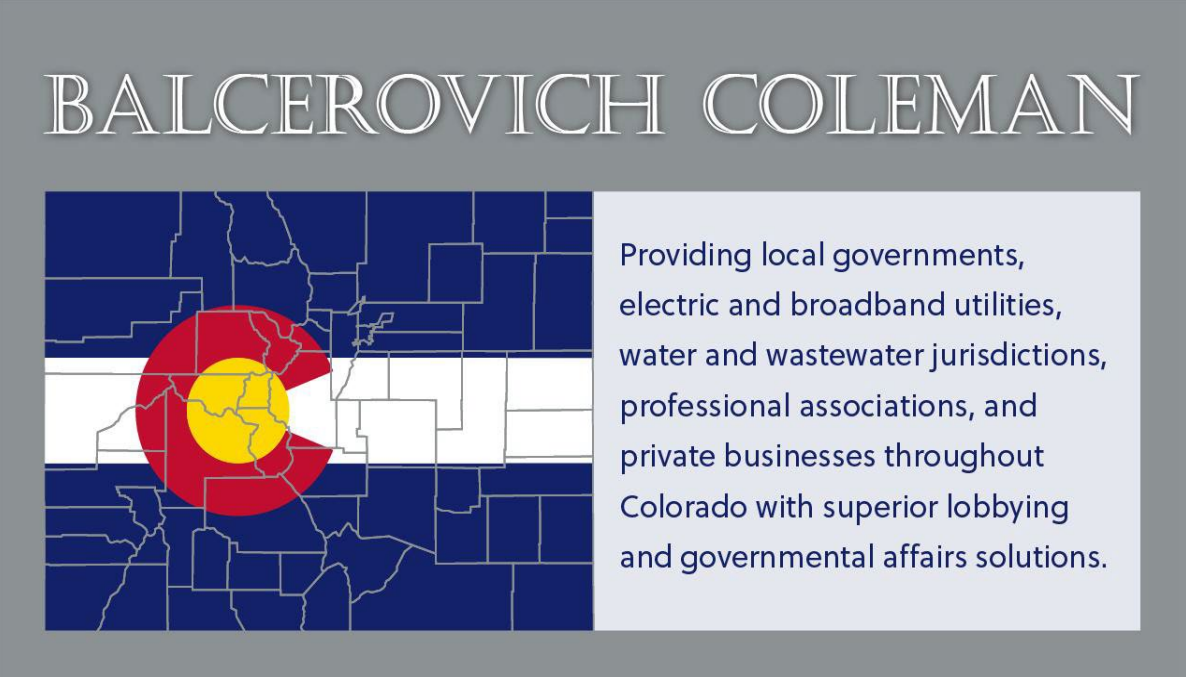DATE POSTED: 4.18.2025
General Update and Legislation
Twenty days remain in Colorado’s 2025 legislative session — but who’s counting? As of Wednesday, April 16, 700 bills have been introduced. Consistent with its annual tradition, the Colorado General Assembly will be closed tomorrow in observance of Good Friday. Consequently, we’re issuing this week’s Notes From the Capitol — a day earlier than we otherwise would. Lucky you!
After Easter, the General Assembly often works weekends in hopes of wrapping up before Sine Die at 12:00 midnight on Wednesday, May 7, 2025. Still, it’s hard to imagine lawmakers working through the current backlog of bills, not to mention the wave of late bills yet to be introduced. Rumors are swirling about the Capitol that the House is prepared to drop roughly 75 late bills in the week following Easter. Whether that’s true or the majority party is merely posturing to dissuade Republicans from filibustering is unclear. For its part, the Senate has roughly two dozen late bills in the pipeline. Many late bills are intended to ‘push back’ against the Trump Administration.
This week, the legislature waded into several controversial debates following relatively uneventful budget debates. Typically, the budget is among the most contentious issues of the annual session. However, the bleak fiscal outlook subdued the debate this year (more on that in the next section).
Lawmakers spent many hours debating legislation aimed at resisting Trump-era policies. For example, Senators Julie Gonzales (D-Denver) and Mike Weissman (D-Aurora) partnered with Representatives Elizabeth Velasco (D-Glenwood Springs) and Lorena Garcia (D-Denver) to introduce SB25-276: Protect Civil Rights Regarding Immigration Status. Current law prohibits state agencies from disclosing personal identifying information or requesting immigration status details unless otherwise required by law. This sweeping thirty-page bill extends those protections to the judicial and legislative branches and all local political subdivisions (cities, counties, school districts, special districts, higher ed institutions, etc.). The legislation prohibits asking for or requiring information about student visa sponsorships and student aid at colleges and universities. Disclosures made before June 30, 2025, are exempt. The bill mandates that these entities retain written records of third-party information requests and report them quarterly to the Governor’s Office and the Attorney General. Civil penalties for violations apply to political subdivisions. The highly controversial bill has been significantly amended through Senate committee and floor debate; it passed Second Reading and awaits Third Reading before going to the House.
Meanwhile, the House debated HB25-1321 — Support Against Adverse Federal Action, sponsored by Speaker Julie McCluskie (D-Dillon) and Joint Budget Committee Vice Chair Representative Shannon Bird (D-Westminster). The bill appropriates $4 million from the Infrastructure Investment and Jobs Act Cash Fund to the Governor’s Office for legal expenses in response to federal actions that may impact the state. It passed the House and is headed to the Senate.
These two bills exemplify the majority party’s intent to position Colorado as a bulwark against the Trump Administration. That said, the minority party is actively pushing back with spirited debates, seeking to amend or slow the progress of these measures.
Budget, Budget, Budget…
Regardless of the year, there are always winners and losers in the state budget. However, budget losers vastly outnumber budget winners this year. As discussed in previous Notes From the Capitol, the Joint Budget Committee (JBC) is charged with eliminating $1.2 billion from Colorado’s FY2024/25 state budget.
Though both the Senate and House have voted to approve the budget, the JBC is working to reconcile various amendments and "budget-orbital bills". Long story short, we will unlikely have a final state budget before next week.
Among the hardest hit casualties of state budget cuts are agencies tasked with implementing new policy initiatives. Most notably, the Office of Economic Development & International Trade (OEDIT) faces approximately a 25% across-the-board cut, significantly more than most other agencies, which saw cuts averaging 5%-10%. These reductions are expected to result in minimal salary increases for state employees and could lead to hiring freezes in some departments.
Another of the biggest losers of this budget cycle: local governments. The Colorado Municipal League (CML) estimates that local governments face approximately $138.7 million in cuts, directly through reduced state appropriations or indirectly through cuts to state agency programs that support local efforts.
Medicaid providers fared better than most budget line items. Though Medicaid overruns contributed to budget instability, Medicaid providers received a 1.6% reimbursement rate increase.
The Sundance Film Festival also won. Though the fiscal note for HB25-1005: Tax Incentive for Film Festivals is small, the bill authorizes approximately $34 million in tax incentives over time. These incentives are designed for long-term impacts on state revenue and TABOR refunds. That said, proponents argue the economic benefit outweighs the cost, particularly via tourism dollars flowing to local communities, especially the Sundance Film Festival host, Boulder.
2026 Democratic Primaries Are Heating Up
The Capitol is buzzing this week with announcements from candidates competing in the 2026 races for Governor, Attorney General, State Treasurer, and Congress. U.S. Senator Michael Bennet (D-CO) made waves with his announcement that he’s a gubernatorial candidate. As we’ve seen in recent weeks, when compared to his primary rival, Attorney General Phil Weiser, Bennet enjoys early advantages.
He has a relatively high level of name recognition and a strong earned-media operation; he often appears in national prime-time media interviews. Bennet’s decision to seek the Colorado governorship (Polis is term-limited) will trigger an intensely competitive contest for the U.S Senate seat Bennet would vacate if he wins. A who’s who of Democratic leaders is already being floated as potential contenders, including Congressman Jason Crow (D-Arapahoe County), Congressman Joe Neguse (D-Boulder County), Congresswoman Brittany Pettersen (Jefferson County), former Colorado House Speaker KC Becker (D-Boulder), and former Colorado Senate President Steve Fenberg (D-Boulder).
Secretary of State Jena Griswold has officially thrown her hat into the ring in the race for Attorney General. She joins Boulder District Attorney Michael Dougherty and former Speaker of the House Cristina Duran (D-Denver) in the primary.
Two Democratic legislators have declared candidacies for State Treasurer: current Joint Budget Committee Chair Senator Jeff Bridges (D-Greenwood Village) and Representative Brianna Titone (D-Arvada).
Former U.S. Congresswoman Yadira Caraveo (D-Thornton) announced her intention to challenge State Representative Manny Rutinel (D-Commerce City) in the Democratic primary for Colorado’s 8th Congressional District. Caraveo, a congressional freshman, lost her seat to then-State Representative, now Congressman, Gabe Evans (R-Weld) and aims to reclaim the seat. CD-8 remains among the most competitive congressional districts in the nation. We suspect the district may vacillate between political parties until the next round of once-a-decade redistricting occurs in 2030, applicable to the 2032 general election.
Shout-out of the week: Paws at the Capitol
Recently, the phrase "Dog Days of the Legislative Session" has taken on a new meaning. The days are long, and with 120 grueling days on the calendar, the pace of progress under the Gold Dome often feels endless — like the Dog Days of Summer. Over the years, a delightful trend has emerged to help break up the monotony: dogs at the Capitol.
Though our State Capitol Building is not officially dog-friendly, an unspoken, unofficial rule now governs its storied marble halls and offices: Well-behaved pups of elected officials and staff are welcome — if they don’t disrupt proceedings. The presence of friendly, well-behaved dogs in the Capitol elevates the mood of legislators, lobbyists, staff, and visitors alike.
We, at Balcerovich Coleman, are pet people. Steve has a French Bulldog (St. Francis), and two pale-orange rescue-cat brothers named for different archangels (Gabriel & Raphael). Tim is the proud companion of a pittie mix named Leo.
We are pleased with the relaxed environment that dogs contribute to our Capitol workplace. We rarely pass up the chance to give them some well-deserved attention, and in so doing, lower our daily stress levels.
Our favorite Capitol pupster this year is G.R. Pippin, Representative Karen McCormick’s Golden Retriever. Representative McCormick (D-Longmont) is the sole veterinarian in the General Assembly and chairs the House Agriculture, Water & Natural Resources Committee. Pippin is hardly the only adorable pup making the rounds. Want to meet a few of the canine companions that hang out at the Capitol? Check out the Colorado Sun’s article and a heartwarming Rocky Mountain PBS video.
As always, please contact us with questions. In the meantime, we wish you and your family a blessed Easter weekend.
Sincerely,
Steve Balcerovich Tim Coleman
Steve@BalcerovichColeman.com Tim@BalcerovichColeman.com
DATE POSTED: 4.4.2025
General Update and Legislation
As of today, 33 days remain in Colorado’s 2025 legislative session. That’s right; just over a month remains for the General Assembly to finalize the state budget, consider/debate a massive backlog of proposed legislation, and push through multiple controversial public policy initiatives. With the introduction of the Long Bill (the state’s budget bill) and, by extension, roughly five dozen budget-orbital bills, legislators have introduced 100 more late bills since our last Notes From the Capitol.
So far, this session's total number of bills stands at 647 in the first 87 days. Not to worry; legislators intend to introduce many more bills in the remaining 33 days – to say nothing of a likely special legislative session Governor Jared Polis contemplates this summer to further amend the state budget to account for alarming state stagflation amid the scope and pace of the Federal government’s extraordinary downsizing.
The Senate passed its version of the budget this week. The House intends to take up the budget starting next week. Please stand by for a flurry of fireworks: we will soon see how much tolerance the Colorado House has for both its ultra-left-wing progressive and its ultra-right-wing conservative members.
Among the few tools the House minority possesses to slow bill passage — and perhaps even extract a hard-fought amendment or two from, and otherwise negotiate with, the majority party — is to require a House reader to read one or more entire bill(s) aloud, word-for-word, on the House floor. We understand at least one member of the minority party is inclined to ask (require) that a House reader verbally convey all 728 pages of the Long Bill. Yikes! Assuming a House reader reads one page per minute, 12 hours would be required to read the Long Bill alone.
Neither legislators nor special interest groups with pet projects are taking the $1.2 billion in state budget cuts lying down. The Senate considered 64 proposed amendments this week but approved only eight. However, to be considered for adoption in the final budget, both chambers must adopt each budget amendment. And even then…
Among the best-kept secrets under the Gold Dome is that regardless of which, if any, budget amendments make it through both chambers, the Joint Budget Committee (JBC) has the final say. It’s great to be one of six on the mighty JBC — or is it?
As reported previously in Notes From the Capitol, speculation is swirling around the potential introduction of a Colorado Energy Office late bill that, if approved, would require the utility sector to reach zero carbon emissions by 2040 — with limited consideration of reliability or affordability. This effort hit a speed bump last week. Over 60 groups, including utilities and many of the state’s most influential labor and business entities, signed a joint letter to both House and Senate leaders, firmly asserting that the conceptual legislation reflects no meaningful stakeholder input, is unworthy of primetime scrutiny, and should not be introduced this legislative session. While this may not stop the Colorado Energy Office from pursuing the bill, the letter highlights many inadequacies that would result in substantial utility rate increases in every community of the state. A copy of the letter can be found here.
Additional eyebrow-raising late bills are likely to be forthcoming, which will consume legislator debate time and patience. For example, we expect legislation to propose additional immigrant protections and other divisive social issues. Also pending are two competing ways to reform the often used-and-abused process through which tiny partisan vacancy committees composed of party insiders fill vacant legislative seats: HB25-1315 versus a proposed legislative referred ballot measure HCR25-1002.
Majority Party Attacks TABOR in Waning Weeks of Session
Last week, Representative Sean Camacho (D-Denver) introduced House Joint Resolution HJR25-1023 requiring the Colorado General Assembly to file a lawsuit to determine the constitutionality of the Taxpayer’s Bill of Rights (TABOR). Semester-long law school classes could be taught on countless legal battles over TABOR by Democrats and liberal/progressive interest groups seeking to whittle down or eliminate the revenue caps on state-budget growth embedded in TABOR. In 2011, a coalition of local governments and TABOR-reform advocates sued the State of Colorado over TABOR’s constitutionality. However, after a decade of appeals, the lawsuit was dismissed due to technical issues regarding legal standing in federal court. HJR-1023 requires the General Assembly to file a lawsuit in state court.
Regardless of your feelings about TABOR, it’s been debated ad nauseum for over thirty years. Short of voter approval — or a decisive ruling against TABOR’s constitutionality from either the Colorado Supreme Court or the U.S. Supreme Court — TABOR will remain at the epicenter of Colorado’s tax-and-spend governance.
In a recent Colorado Politics article, the highly controversial author of TABOR, Douglas Bruce, quipped: "Is this an April Fool's joke? They're a little late. It's been more than 30 years since it passed."
However, under no circumstances will legislators in the minority party accept the adoption of HJR25-1023; they will use every alarm bell, panic button, delay tactic, filibuster, legal tool, social media platform, traditional media outlet, and other resource at their disposal to stop (or at least delay) any proposed erosion of TABOR. Because the proposed resolution has state-fiscal impacts, before being debated on the House floor, the resolution must first make it through the House Finance Committee and, separately, the House Appropriations Committee.
Separate, apart from, and in addition to TABOR’s straightforward constitutional provision strictly prohibiting any tax increase without first securing voter approval is TABOR’s separate, complex, and punitive state spending provision we refer to as the ‘annual automatic ratchet-down effect’ on our state budget. Without overloading you with technical details, suffice it to say that we anticipate the introduction of at least one additional controversial late bill seeking to address TABOR’s annual automatic ratchet-down effect.
Shoutout of the week: Colorado State Patrol
This week, we express deep gratitude to the men and women of the Colorado State Patrol, who work relentlessly to keep the Capitol, legislators, staff, lobbyists, and visitors safe. Though the security they provide often goes unnoticed and un-thanked, state patrol officers are present each day to ensure safety.
They monitor all Capitol entrances and exits, manage and staff weapons and metal detectors at each entrance, prevent disruptions, and, in emergencies, serve as first responders. They assist the House and Senate Sergeants maintain order during all legislative proceedings. State patrol security checks sometimes feel like annoying and time-consuming inconveniences, but they are essential. One morning this week, as we were going through security, a state patrol officer asked to inspect our coffee cups. We were admittedly surprised and slightly taken aback. However, we soon learned that someone using a metal coffee mug earlier in the week had attempted to smuggle knives into the Capitol.
Securing the Capitol is an extraordinarily demanding job. We go through the equivalent of airport security to access the capitol building multiple times daily. Thankfully, our state patrol is far more friendly than the TSA staff. We honor and thank our state patrol officers for their conscientious vigilance, good humor, and constant protection.
Go, Rockies! Have a great weekend.
Steve Balcerovich / Tim Coleman
Steve@BalcerovichColeman.com / Tim@BalcerovichColeman.com
720.351.2007 / 303.242.9270
DATE POSTED: 3.30.2025
General Update and Legislation
Forty-seven days remain in Colorado’s 2025 regular legislative session. In the context of a staggering $1.2 billion pending budget cuts — the specifics of which legislators and the Governor’s office will wrestle for the next three to four weeks — the pace of new bill introductions has slowed. Fear not, however. Lawmakers have so far introduced 550 bills. Many more are in the pipeline.
Lobbyists are trying to persuade Joint Budget Committee (JBC) members to champion/save their respective client programs and pet projects, even as myriad state agency programs face debilitating cuts. We anticipate the Senate will introduce the annual Long Bill (the state’s budget) next week. Until legislators approve the budget passes both chambers, most normal legislative work will grind to a halt.
For the first time since 2017, the Colorado House of Representatives moved to create a more builder-friendly construction defects policy. During a lengthy, tense hearing, the House Transportation, Housing & Local Government Committee considered competing construction defects bills. The first, HB25-1261, sought a more favorable litigation environment for homeowners pursuing construction-defect claims in condominium construction. The committee unanimously postponed that bill indefinitely. Its death paved the way for HB25-1272 to advance. HB25-1272 requires an independent third party to inspect condo construction and mandates that builders address any/all identified issues before project completion. By preemptively identifying and resolving potential construction defects, the bill will, theoretically, result in fewer construction defect lawsuits that disincentivize homebuilders/developers from supplying condo-based affordable housing. In a welcome display of strong bipartisanship, the House Transportation, Housing & Local Government Committee forwarded HB25-1272 to the House Floor on a 12-to-1 vote.
In the energy sector, nuclear power is having a moment. After years of unsuccessful attempts by Senator Larry Liston (R–Colorado Springs) and others, multiple nuclear energy bills seem to be making their way toward Governor Polis’ desk. One such bill focuses on workforce development for Colorado-based nuclear-power energy jobs, while another classifies nuclear energy as a clean energy resource. Both bills represent modest steps but lay essential groundwork for Colorado’s nuclear energy development. As a practical matter, Colorado is probably a decade or more away from building/permitting nuclear generation units. For historical context, the Public Service Company of Colorado’s Saint Vrain Nuclear Power Plant remains the one and only example of a nuclear power operation in Colorado. Though PSC ran the facility from 1979 to 1989, it was plagued by operating challenges and cost overruns. We are cautiously optimistic about the potential.
In the realm of oil and natural gas production/regulation, legislators have introduced very few bills. The "grand deal" struck during the 2024 legislative session between the Polis administration, environmental advocates, and oil and gas operators seems to be holding. The delicate compromise informally pauses new legislation for the foreseeable future. We are waiting with bated breath to see which (if either) side breaches that agreement first.
Under prolonged siege, will local control continue to decline – or die?
Colorado has long been a bastion of cherished local control. In 1902, Colorado voters amended the state constitution to grant greater power and flexibility to municipalities via an option of Home Rule. A similar constitutional amendment passed in 1970, extending the same Home Rule option to counties.
So, what is Home Rule? Home Rule is a special status of semi-autonomous local control our state allows municipalities and counties that comply with specific terms and conditions. For example, a city or county seeking Home Rule status must first appoint and convene a local charter commission and secure voter approval for the resulting charter. The charter is essentially the equivalent of a local constitution; it defines the local self-governance powers, parameters, processes, structures, the scope of services, and departments and often enshrines various community priorities. Local voter-approved charters (and subsequent charter amendments) encapsulate local self-governance flexibility that historically supersedes the relatively rigid statutory scheme within which statutory municipalities and counties must operate. Home Rule designation often carries with it local sales and use tax-collection-and-spending, TABOR, and de-Brucing implications.
In recent years, the legislature and Governor have collaborated to undermine local control and bring Home Rule jurisdictions to heel – especially in land use and permitting.
In the 2025 session alone, legislators have introduced bills requiring local jurisdictions to permit wireless telecommunications facilities, electric fencing, and automated solar permitting for residential homes. Legislators continue introducing bills featuring local zoning-approval mandates for affordable housing, density, and transportation-oriented communities.
By any objective standard, the legislature and governor have substantially eroded local control and infuriated municipal and county elected officials. We suspect legislators and the governor will continue proclaiming the merits of local control while eroding it.
As we see it, although disheartened and under siege, local control advocates remain resolutely unprepared to surrender. In the face of multiple recent losses, they do their best to soldier on and fight another day.
As a practical matter, local control is substantially diminished – but not dead.
Welcome Senator Katie Wallace (D-Longmont)!
On Tuesday, March 18th, 114 Boulder County Democrat Party activists and insiders filled the vacancy created when former Senator Jacquez Lewis (D-Lafayette) resigned in disgrace over controversies surrounding her alleged mistreatment of legislative aides.
The Democratic Party’s Senate District 17 Vacancy Committee, essentially a sub-division of the Colorado Democratic Party in Boulder County, considered eight candidates. However, in the first (and, as it turns out, the only) round of voting, Katie Wallace garnered 58% of the votes cast by the 114 participating vacancy committee members. Colorado Supreme Court Chief Justice Monica Márquez swore Senator Wallace in this morning.
Having worked for Congressman Joe Neguse and now-former Congresswoman Yadira Caraveo, Senator Wallace was most recently executive director of the Colorado Democratic Senate Campaign Fund.
Inside baseball on vacancy committee voting methodology. If a single candidate fails to secure a simple majority of votes in the first round of voting, candidates who receive more than 15% may step aside or advance to the next round. Subsequent rounds of voting continue until one candidate wins a simple majority of participating vacancy committee members.
Former Senator Jaques Lewis’ allegedly false statement and written submittal to the Senate Ethics Committee investigating her conduct have intensified public and media scrutiny and the investigation itself. Colorado Politics reports that the Denver District Attorney and the Boulder County District Attorney have opened separate investigations into former Senator Jacquez Lewis’ behavior.
Shoutout of the Week: Legislative Aides
Unlike members of Congress, who often have a dozen staff or more, Colorado senators and representatives have precious few staff. However, what legislative aides lack in numbers, they usually make up for in quality. Behind every great legislator is a fantastic legislative aide.
Though poorly paid, legislative aides play essential roles: gatekeeper, scheduler, researcher, constituent services manager, and all-around administrative assistant. But many legislative aides go far beyond these duties — providing policy research, coordinating the drafting of proposed amendments, and assisting with countless other tasks legislators request.
This month, we recognize a few of our favorite aides who regularly go above and beyond in service to the legislator(s) for whom they work. We extend a warm and sincere THANK YOU to the following and their fellow aide-colleagues for their relentless hard work and cheerful dedication. The joint would fall apart without you!
ï§ Daniel, aide to Representative Tisha Mauro’s (D–Pueblo)
ï§ June, aide to Representative Bob Marshall (D–Highlands Ranch)
ï§ Maggie, aide to Rebekah Stewart (D–Durango)
ï§ Hailey, aide to Senator Dafna Michaelson Jenet (D–Commerce City)
ï§ Kevin, aide to Senator Janice Rich (R–Grand Junction)
Steve Balcerovich /Tim Coleman
Steve@BalcerovichColeman.com / Tim@BalcerovichColeman.com
720.351.2007 / 303.242.9270
DATE POSTED: 3.10.2025
As of Friday, March 7th, 61 days remain in Colorado’s legislative session. Come Monday, we will have passed the halfway point. Legislators have so far introduced approximately 538. While bill introductions are slowing, committee hearing lengths are growing. Tempers are flaring, and Republican filibusters of Democrat bills are jamming the calendar and creating a backlog that elicits anger and exhaustion. As but one of many examples, the House Health & Human Services Committee met until 1:00 a.m., Thursday, before adjourning — with two substantive bills remaining on its docket.
The existing $1 billion budget shortfall prompts legislators to gut or kill bills with a fiscal note. However, legislators routinely circumvent or preempt dreaded fiscal notes and Colorado’s voter-approved Taxpayer Bill of Rights Amendment (TABOR Amendment), prohibiting government jurisdictions from raising taxes without securing voter approval. How do legislators circumvent or preempt fiscal notes? They seek to finance proposed legislation via so-called “user fees” and in some cases “enterprise funds” in which the users/beneficiaries pay user fee(s) designed to cover every conceivable cost associated with designing, building, operating, maintaining, financing, and delivering a project and/or service — including essential equipment, materials, office space, overhead, and staff. Alternatively, legislators seek to fund legislation via unfunded mandate(s) on private businesses and local governments.
Whether taxes, user fees, or unfunded mandates, the net result is much the same: first, here in Colorado, state and local governments monetize everything; and second, our residents pick up the tab regardless of legal distinctions that many view as too clever by half.
Suffice it to say that tensions are high under the Gold Dome. The spirited debates inside legislative chambers and the lobby are just beginning. No worries. Balcerovich Coleman is intimately familiar with the annual routine and is on the rail daily, amplifying your voice and safeguarding your interests.
General Update and Legislation
As noted in our previous Notes from the Capitol, some of this session’s most controversial legislation has not yet been heard in the first committee of reference of the second chamber. For example, the Senate approved a highly contentious bill to restructure and streamline Colorado’s Labor Peace Act via SB25-005: Worker Protection Collective Bargaining. However, House leadership is holding it up while proponents and opponents continue working to negotiate a settlement. For a refresher, the bill seeks to eliminate the second of two required votes for collecting dues on non-union members, making it substantially easier for workers and organized labor to establish union shops. Historically, the statutorily mandated second vote requires the affirmation of 75% of the workers. While the bill is tentatively scheduled for the House Business Affairs & Labor Committee on Thursday, March 13th, it is entirely unclear whether an agreement will be reached.
In the healthcare space, many bills introduced this year seek to make healthcare more affordable for Coloradoans without negative fiscal impacts on the state budget and Medicaid system. One particularly controversial proposal is SB25-071, Prohibiting Restrictions on 340B Drugs. The bill protects covered entities under the federal 340B drug pricing program from restrictions or discrimination by drug manufacturers, wholesalers, and other entities when acquiring or receiving discounted outpatient drugs. It also prohibits drug manufacturers from requiring covered entities or their contract pharmacies to submit unnecessary health data unless mandated by federal law. Violations would be considered unfair trade practices under Colorado’s Consumer Protection Act, enforceable by Attorney General Phil Weiser. Hospitals participating in the 340B program must disclose their financial benefits and savings usage on a publicly accessible website. The bill prompts a bitter showdown between the pharmaceutical industry and hospitals and wreaks havoc on scheduling other legislation in the Senate Health & Human Services Committee.
Wildfire policy remains a hot topic at the General Assembly, especially after the devastating SoCal fires. Due to staggering payouts in recent years, insurance companies increasingly refuse to issue fire-damage and hail-damage protection coverage, leaving homeowners liable. Balcerovich Coleman secured an early draft of legislation that attempts, in some small way, to address this growing issue. The bill would establish two enterprise funds within Colorado’s Division of Insurance: the Strengthen Colorado Homes Enterprise and the Wildfire Catastrophe Reinsurance Enterprise. The Strengthen Homes Enterprise would collect a 1.5% fee on homeowner’s insurance premiums to fund grants that help homeowners upgrade roofs with resilient materials, reducing insurer risk from extreme weather events. The Reinsurance Enterprise would provide financial support to insurers for wildfire-related disasters by issuing catastrophe bonds, collecting insurer fees, if needed, and requiring insurers to offer coverage in high-risk wildfire areas while regulating homeowner’s insurance rates to prevent price gouging.
Colorado’s Next Governor?
Governor Jared Polis (D) is serving the final two years of his second four-year term. Democrats have held the office for 16 consecutive years. The last Republican to hold the office was Governor Bill Owens (1999 to 2007). Before Governor Owens, Colorado had back-to-back Republican Governors, John Love (1963-1973), followed by Lieutenant Governor John Vanderhoof, who stepped in as Governor from 1973 to 1975 to fill the balance of Governor Love’s term after President Richard Nixon appointed Governor Love as the nation’s first Director of the Office of Energy. Those three Republicans aside, Democrats, including Governors Stephen McNichols (1957-1963), Richard Lamm (1975-1987), Roy Romer (1987-1999), Bill Ritter (2007-2011), John Hickenlooper (2011-2019), and Jared Polis (2019-2026) have dominated the executive branch for most of the last 70 years.
Attorney General Phil Wieser is the first major candidate to announce his gubernatorial candidacy. Secretary of State Jena Griswold, U.S. Senator Michael Bennet, and Congressman Joe Neguse are among others allegedly considering a run. Though it excluded Senator Michael Bennet, an early December 2024 Magellan Strategies’ Healthier Colorado poll suggests that, by a narrow margin, Congressman Joe Neguse may be the preferred contender in a potential Democratic field. Despite the positive results from the Healthier Colorado poll, it is rumored this week that U.S. Rep. Joe Neguse will not run for Governor after all.
This week, Secretary of State Jena Griswold is embroiled in yet another controversy, this time concerning campaign finance improprieties. Colorado Politics reports the Colorado Department of Law will investigate the sixth campaign finance complaint filed against Griswold by the Public Trust Institute since June 2022. The most recent alleged violation pertains to an unreported campaign finance expenditure for the website domain jenaforgovernor.com. The Public Trust Institute alleges that Griswold failed to submit the required affidavit to run for Governor before purchasing the campaign domain. When confronted, her brother lied about the purchase. This comes on the heels of other controversies over the years, including that voting equipment password(s) were posted online and publicly accessible in the lead-up to the 2024 November election.
Senator Mark Baisley (R-Woodland Park) and Representative Scott Bottoms (R-Colorado Springs) have both announced their intent to seek the Republican nomination for governor. A few other lesser-known Republicans have also announced their respective bids.
Colorado Freshmen Congressman Jeff Crank’s suggestion that the Small Business Administration (SBA) Office in Denver be relocated and similar sentiments from Congresswoman Lauren Boebert suggest that the Trump administration and its congressional allies are well positioned to use every resource and pressure point at their disposal to bring Colorado and other so-called ‘Blue States’ to heel. Will they close or relocate Denver’s SBA office? What about the Denver Mint, the Denver Branch of the Federal Reserve Bank of Kansas City, NCAR, NREL, the Federal Center, and other federal facilities? Could the Feds withhold Colorado’s fair share of federal aviation, highway, and transit dollars to secure policies and cooperation consistent with those of the Trump administration? What about the national forests, parks, and monuments in Colorado? Amid a $36.3 trillion national debt, we don’t know. However, in that context, regardless of who the Republicans nominate for governor — especially now that Dave Williams has announced he will not seek re-election to his position as Colorado Republican Party Chair — we fully anticipate that Colorado’s Republican gubernatorial nominee will launch a robust and sharply competitive campaign.
Join us in wishing Senator Lisa Frizell every possible success in recovery!
Last week, Senator Lisa Frizell (R- Castle Rock) offered a compelling, profoundly personal, and understandably emotional speech on the Senate floor about her stage 1 breast cancer diagnosis and surgery. Before her surgery, Senator Frizell released a statement for her Senate District 2 constituents, stating:
"I am accountable to them and always want to be transparent. I want it to be clear that I will not stop fighting for the good people in Senate District 2 while simultaneously fighting this new battle. I am not going anywhere. I will be fine.”
During her speech, she noted that roughly 5,500 women and men are diagnosed with breast cancer every year in Colorado. She encouraged folks to undergo regular testing. Senator Frizell ended her speech by stating, “I am going to beat cancer,” and affirmed her commitment to her constituents.
We work closely with and respect Senator Frizell and commend her courage, determination, and strength. As the opportunity presents itself, please consider sending her a card or offering words of support.
Have a fantastic weekend!
Steve Balcerovich Tim Coleman
Steve@BalcerovichColeman.com Tim@BalcerovichColeman.com
DATE POSTED: 2.21.2025
Notes from the Capitol (Vol 4)
As of Friday, February 21, 2025, 75 days remain in the legislative session. Nearly 500 bills have so far been introduced. In what can only be fairly characterized as a well-intentioned annual ritual, the leadership in both chambers claim they intend to crack down on the introduction of ‘late bills,’ thereby streamlining the second half of the session and allowing for more thoughtful, contemplative, responsible legislating. Many more late bills are in the pipeline. In the context of the existing constitutional limit of 120 days per regular annual legislative session, forcing legislators to consider and debate 600 or 700 substantive bills thoughtfully constitutes a wholly unnecessary pressure-cooker environment. We wonder whether legislators or voters will be the first to seriously consider limiting the number of bills each legislator can introduce per annual session. Hhhmmm…
General Update and Legislation
Governor Jared Polis, legislators, state agency staff, and interest groups are alarmed about the Trump Administration’s withholding of $570 million in previously allocated federal funds for Colorado and the practical consequences of the unceremonious dismantling of the federal workforce, which, if it continues in the context of the TABOR Amendment, will severely impact Colorado’s people, families, local jurisdictions, and economy. Governor Polis and Senators Michael Bennet and John Hickenlooper issued a joint letter urging the Trump Administration to release the funds. Congress earmarked most of that $570 million for emission reduction, grid resiliency, and renewable energy production programs. Fearing the worst, stakeholders are in financial and planning limbo as they await a resolution.
Check out the following responsible, reliable media stories:
ï§ Sarah Mulholland of Colorado Public Radio: As job cuts for Colorado’s federal workers roll across the state, some share their stories.
ï§ The Congressional Research Service’s Current Federal Civilian Employment by State and Congressional District (Dec. 20, 2024).
Colorado Attorney General Phil Weiser has joined other State Attorneys General in filing lawsuits against the Trump Administration. Colorado has joined in lawsuits relating to the federal funding freeze, defunding medical and public health research, questioning the Department of Government Efficiency’s (DOGE) legality to access the U.S. Treasury's central Payment System, and more.
Our bitterly divided national politics continues seeping into debates under Colorado’s Gold Dome. Sharply emboldened by the Trump Administration, Republican legislators have introduced legislation to align Colorado with federal policies on immigration, abortion, gender-affirming care, and more. Lopsided Democratic majorities, however, push back by introducing progressive bills and by
killing bills inconsistent with the left’s agenda that cost Democrats the White House and both chambers of Congress in 2024 – to say nothing of the reigning conservative supermajority on the U.S. Supreme Court.
We respectfully acknowledge the nation’s $36.3 trillion (and growing) national debt and our over $700 billion U.S. budget deficit. However, we are increasingly concerned that the behavior of Colorado’s progressive legislature will enrage the Trump Administration, which is better positioned by the day to strip Colorado of federal highway funding, national park funding, and other federally funded institutions. How wise is it to poke a wild Kodiak Bear in the eye while he’s feeding? For their part, President Trump and Elon Musk are floating the idea that 20% of DOGE’s $2 trillion savings be redirected away from paying down the national debt to, instead, issuing each American citizen a $5K. Really? It’s good to be President.
Nevertheless, the Democratic-controlled Colorado Senate passed two landmark bills this week, including SB25-003: Semiautomatic Firearms & Rapid-Fire Devices and SB25-005: Worker Protection Collective Bargaining, which we highlighted in an earlier Notes from the Capitol. Unlike previous years, both bills have passed the Senate and now face little opposition in Colorado’s more progressive House.
Featuring fanfare from Governor Polis and bill sponsors earlier this week, Democrats introduced their highly anticipated construction-defect legislation, HB25-1272. The bill requires an independent third-party inspector to conduct inspections during condo construction and mandates builders to address any identified issues before project completion. However, they did so after the Colorado Trial Lawyers and their allies introduced a competing measure, HB25-1261, creating a more favorable litigation environment for individuals pursuing condo construction-defect claims. The debate over these two bills sparks substantial tensions within the ruling Democrat majority.
Senator Sonya Jacquez Lewis (D-Lafayette) Resigns Over Ethics Complaints Via a Facebook post and following a series of ethics complaints, Senator Sonya Jacquez Lewis (D-Lafayette) resigned on Tuesday, February 18th. As noted in a previous edition of Notes from the Capitol, the bipartisan ethics committee was investigating her for alleged mistreatment of her legislative aides. She abruptly resigned immediately before the ethics committee was scheduled to discuss a new allegation that at least one letter of support she submitted was fabricated. Before her resignation, Senator Jacquez Lewis was stripped of all committee assignments for the 2025 legislative session and was barred from using Senate funds to pay for her legislative aides.
Before stepping down, Senator Jacquez Lewis claimed the allegations were an effort by legislative aides to push for collective bargaining but failed to cite the ethics complaints as a reason for her resignation. The Senate District 17 Democratic Vacancy Committee of Boulder, Broomfield & Weld Counties will select Senator Jacquez Lewis’ replacement. However, the vacancy process could take several weeks.
Shoutout to Legislative Legal Services
Legislative Legal Services serves as the nonpartisan, in-house counsel for the Colorado General Assembly. Its staff attorneys play an essential role in drafting state legislation, preparing amendments, and providing legislators with procedural and legal guidance throughout the bill drafting, committee hearings, and floor work. Their work is extraordinarily challenging, requiring them to draft amendments on demand in committee hearings and on the floors of both chambers. In addition, Legislative Legal Services staff reviews administrative rules, provides public comments on initiated ballot measures, and serves as a vital public resource. Though behind the scenes, these attorneys ensure that statutes accurately reflect legislative intent throughout bill drafting and amendment processes. Without their expertise and hard work, the General Assembly would come to a standstill. Please join us in extending a warm and sincere thank you to all the members of Legislative Legal Services!
With nearly two-thirds of the legislative session ahead, please contact us with questions, insights, and/or suggested topics you’d like us to feature in the future.
Onward and upward. Have a great weekend!
Steve Balcerovich Tim Coleman
Steve@BalcerovichColeman.com Tim@BalcerovichColeman.com
Date Posted: 2.7.2025
Notes from the Capitol
Volume 3: Friday, February 7, 2025
As of today, Friday, February 7th, 89 days remain in our regular annual 120-day legislative session. As of yesterday afternoon, legislators have introduced 351 bills and continue shopping around late bill drafts for stakeholder input. A mad scramble is underway to push bills with no fiscal impact through both chambers to the governor's desk before legislators are consumed with brutal budget battles destined to commence in late March – all in the context of eliminating an estimated $ 1 billion from our state budget.
General Update and Legislation
Last week, chaos and confusion unfolded at the Capitol when the Trump Administration, citing the need for a comprehensive financial review, issued a memo temporarily halting federal grants, loans, and other financial assistance to all fifty states and countless local jurisdictions nationwide. Although the administration later rescinded the freeze, the defacto policy whiplash alarmed state and local officials across the political spectrum.
A NOT-SO-TANGENTIAL SIDE NOTE…
We would be guilty of professional malpractice if we failed to acknowledge the precarious position of Colorado’s federal workforce, facilities, and economy. Amid a $36.3 trillion national debt and a $711 billion U.S. budget deficit, grueling uncertainty exists regarding the degree to which, and under what conditions, federal funds will continue to flow to states and territories — especially so-called ‘Blue States’ like Colorado. Though quantifying potential revenue losses may be premature, the practical reality is that Colorado will likely receive substantially fewer federal dollars in the coming fiscal years, exacerbating Colorado’s budget challenges. The Denver Federal Center, headquartered in Lakewood, boasts the largest concentration of federal agencies outside of Washington, DC. Likewise, the National Renewable Energy Laboratory (NREL), headquartered in Golden; the National Center For Atmospheric Research (NCAR), headquartered in Boulder; and the Federal Reserve Bank of Kansas City, Denver Branch, headquartered in Denver, are but a small sample of the many federally funded facilities throughout Colorado.
For statistical information about the federal workforce, check out the Congressional Research Service’s Current Federal Civilian Employment by State and Congressional District (December 20, 2024).
Meanwhile, back at the ranch…
On January 28th, legislators experienced their longest committee hearing so far this year. After nine hours of intense testimony and debate on SB25-003-Semiautomatic Firearms and Rapid-fire Devices, the bill passed the Senate State Veterans & Military Affairs Committee on a 3-2 party-line vote. The bill proposes to ban the sale of semiautomatic weapon firearms that accept detachable magazines. Advocates of SB25-003 have run multiple versions of this legislation for years; the bills typically pass the House and subsequently die in the Senate. We think this bill has a 50% chance of making it to Governor Polis’ desk. It remains entirely unclear whether he would sign it.
Republicans introduced a controversial bill on Wednesday, February 5th, to lower state regulatory costs. Focused primarily, but not exclusively, on environmental regulations, if approved, the 19-page bill would repeal several existing regulatory boards and their associated regulations. With only Republican sponsors, this bill seems destined to gain little traction. Nevertheless, rest assured, it will serve as a spectacle of testimony and debate in the House State, Military, and Veteran Affairs Committee.
We are tracking a number of consequential preliminary draft bills that have yet to be formally introduced. One such eyebrow-raising bill originates from the Colorado Energy Office. It would require electric utilities to reduce emissions by 95% by 2035 — and by a whopping 100% by 2040 (compared with the 2005 baseline). Due to the renewable energy and battery storage investments needed to meet these goals, the bill would result in higher utility rates across the state.
We are standing by to review the proposed Construction Defect-, Tap Fee-, and Data Center Incentives-legislation, none of which are quite ready for prime time.
Manny Rutinel Seeks Colorado’s 8th Congressional District.
State Representative Manny Rutinel (D-Commerce City), serving his second year in the Colorado House representing HD32, recently announced his intent to unseat freshman Congressman Gabe Evans (R-Fort Lupton). Most local political observers recall that Congressman Evans narrowly defeated incumbent freshman Congresswoman Yadiro Caraveo (D-Thornton) in November. While State Representative Rutinel is a relatively new face in Colorado politics, he has impressive campaign fundraising credentials. Within 24 hours of launching his congressional bid, he raised over $400,000. CD-8 is Colorado’s most competitive congressional district and will likely remain as such – at least until 2032, following our next once-in-a-decade congressional reapportionment.
Sergeants-At-Arms
Please join us in extending a warm and sincere THANK YOU to our House and Senate Sergeants-At-Arms. When visiting the statehouse, you will find the Sergeants guarding the House and Senate Chambers entrances and delivering message cards to legislators during floor work. Our Sergeants-At-Arms are among the unsung heroes of the General Assembly. They maintain order and enforce decorum on both chambers' floors and visitors’ galleries. The Sergeants also provide support during the legislative committee hearings, often answer visitor questions about the process, and ensure committee hearings remain uninterrupted. Whereas Sergeants in the House wear green blazers, they wear red blazers in the Senate. Next time you visit the State Capitol Building, thank the Sergeant(s) you encounter for their exemplary service.
We’ll catch up with you via our Notes from the Capitol in two weeks. In the meantime, please contact us with questions, insights, and/or suggested topics you’d like us to feature in the future.
Onward and upward!
Steve Balcerovich Tim Coleman
Steve@BalcerovichColeman.com Tim@BalcerovichColeman.com
Notes from the Capitol
Volume 2 – January 24, 2025
Good afternoon, folks. We are 17 days into the 120-day legislative session, with 103 days remaining. Legislators have introduced roughly one-sixth of all bills we expect this session.
SMART Act Hearings
Legislators are typically preoccupied with SMART Act hearings during the first two weeks of the session. This year was no exception. Annual SMART Act hearings allow state agency staff to brief legislators on the agency's mission, core roles and functions, structure, operations, and priorities — while enabling legislators to scrutinize each agency publicly. Due to the state’s $1 billion budget shortfall, legislators have the unenviable task of deploying meat cleavers to the budget; the tone and tenure of the back-and-forth committee between agency staff and legislators was, shall we say, uncharacteristically adversarial.
Among the most contentious committee hearings this week were a special joint House and Senate energy committee during which Democrat and Republican legislators assertively peppered Public Utilities Commission (PUC) staff about the PUC’s pipeline safety program. Likewise, during a specially convened joint House and Senate Health & Human Services Committee hearing, legislators of both parties sharply questioned Department of Health Care Policy & Financing staff about substantial cost overruns in the state’s Medicaid program.
Legislation
The first batch of House-initiated bills have cleared the House and will be introduced in the Senate next week.
Intent on restructuring (or gutting, depending on whom you ask) Colorado’s Labor Peace Act (circa 1943), the Senate Business, Labor & Technology Committee hosted a four-hours-long hearing on Worker Protection Collective Bargaining (SB25-005). The bill seeks to eliminate the second of two required votes for collecting dues on non-union members, thereby making it substantially easier for workers and organized labor to establish union shops. Historically, the statutorily mandated second vote requires the affirmation of 75% of the workers.
Understanding the highly controversial and politically charged nature of the bill, which, if approved, would reconstitute the relationship between business/management on the one hand and workers/organized labor on the other, the committee chair, Senator Jessie Danielson (D-Wheat Ridge), limited proponents and opponents to two hours of testimony each. Following four hours of testimony, the committee passed the bill 4-3 on a straight party-line vote.
Separately, a much-anticipated consumer protection bill to Prohibit Restrictions on 340B Drugs (SB25-071) seeks to prohibit drug manufacturers from unfair and deceptive trade practices. The bill bans pharmaceutical companies from limiting discount drug programs to benefit only their preferred pharmacies. SB25-071 tees up a colossal battle between hospitals and pharmaceutical companies.
Controversy Over Vacancy Committee Elections
The Democratic House District 41 Vacancy Committee met on Saturday. It appointed Jamie Jackson (D-Aurora) to fill the vacancy created when a different vacancy committee appointed then-Representative and now-Senator Iman Jodeh (D-Aurora) from the House to the Senate.
While partisan vacancy committee appointments are legal and routine, the frequency of their use raises eyebrows across the political spectrum and various media outlets. By securing an appointment via a partisan vacancy committee, thirty legislators — roughly one-third of the 100-member 2025 General Assembly — initially circumvented the public scrutiny of the regular primary and general elections. However, most of these appointed legislators subsequently ran for and won their respective seats in the election cycle following their vacancy committee appointment. Since 2018, we’ve seen multiple poorly organized and ineffective attempts to eliminate vacancy appointments in favor of special elections. To date, all such efforts have failed.
Ethics Committee Investigation
As reported in Colorado Politics, Senator Sonya Jacquez Lewis (D-Lafayette) faces a bi-partisan ethics committee investigation of allegations that she consistently mistreats her legislative aides. The Office of Legislative Workplace Relations received a formal complaint on November 15, 2024. Though she remains eligible to cast votes on the Senate floor, Senator Jacquez Lewis serves on no Senate committees and is barred from using Senate funds to pay for her legislative aides.
Stay tuned. The legislature is off to a fast start. Have a great weekend!
Steve Balcerovich & Tim Coleman
Date Posted: 1.6.2025
SENATE LEADERSHIP
President of the Senate James Coleman (D-Denver)
Senate Majority Leader Robert Rodriguez (D-Denver)
President Pro Tempore Dafna Michaelson Janet (D-Commerce City)
Assistant Majority Leader Lisa Cutter (D-Littleton)
Majority Whip Nick Hinrichsen (D-Pueblo)
Majority Caucus Chair Dylan Roberts (D-Frisco)
Minority Leader Paul Lundeen (R-El Paso)
Assistant Minority Leader Cleave Simpson (R-Alamosa)
Minority Whip Senator Janice Rich (R-Grand Junction)
Minority Caucus Chair Byron Pelton (R-Sterling)
SENATE COMMITTEE ASSIGNMENTS
Senate Agriculture & Natural Resources (7 members / 4D & 3R)
Chair: Senator Dylan Roberts (D-Frisco)
Vice Chair: Senator Jessie Danielson (D-Wheat Ridge)
Members:
Senator Nick Hinrichsen (D-Pueblo)
Senator Janice Marchman (D-Loveland)
Senator Byron Pelton (R-Sterling)
Senator Rod Pelton (R-Cheyenne Wells)
Senator-Elect Marc Catlin (R-Montrose)
Senate Appropriations (7 members / 4D & 3R)
Chair: Senator-Elect Judy Amabile (D-Boulder)
Vice Chair: Senator Jeff Bridges (D-Greenwood Village)
Members:
Senator Chris Kolker (D-Littleton)
Senator Julie Gonzales (D-Denver)
Senator Barbara Kirkmeyer (R-Weld County)
Senator Mark Baisley (R-Roxborough Park)
Senator Larry Liston (R-Colorado Springs)
Senate Business, Labor & Technology (7 members / 4D & 3R)
Chair: Senator Jessie Danielson (D-Wheat Ridge)
Vice Chair: Senator Nick Hinrichsen (D-Pueblo)
Members:
Senator Faith Winter (D-Thornton)
Democrat Vacancy
Senator Larry Liston (R-Colorado Springs)
Senator Byron Pelton (R-Sterling)
Senator-Elect Marc Catlin (R-Montrose)
Senate Education (7 members / 4D & 3R)
Chair: Senator Chris Kolker (D-Littleton)
Vice Chair: Senator Janice Marchman (D-Loveland)
Members:
Senator-Elect Cathy Kipp (D-Fort Collins)
Senator Dafna Michaelson Jenet (D-Commerce City)
Senator Paul Lundeen (R-Monument)
Senator Janice Rich (R-Grand Junction)
Senator-Elect Scott Bright (R-Platteville)
Senate Finance (9 members / 6D & 3R)
Chair: Senator-Elect Cathy Kipp (D-Fort Collins)
Vice Chair: Senator Janice Marchman (D-Loveland)
Members:
Senator Chris Kolker (D-Littleton)
Senator Julie Gonzales (D-Denver)
Senator-Elect Marc Snyder (D-Manitou Springs)
Senator Kyle Mullica (D-Thornton)
Senator Cleave Simpson (R-Alamosa County)
Senator-Elect Scott Bright (R-Platteville)
Senator-Elect Lisa Frizell (R-Castle Rock)
Senate Health & Human Services (9 members / 6D & 3R)
Chair: Senator Kyle Mullica (D-Thornton)
Vice Chair: Senator Dafna Michaelson Jenet (D-Commerce City)
Members:
Senator Lisa Cutter (D-Bear Creek)
Senator-Elect Mike Weissman (D-Aurora)
Senator-Elect Lindsey Daugherty (D-Arvada)
Democrat Vacancy
Senator Janice Rich (R-Grand Junction)
Senator-Elect Lisa Frizell (R-Castle Rock)
Republican Vacancy
Senate Judiciary (7 members / 5D & 2R)
Chair: Senator Julie Gonzales (D-Denver)
Vice Chair: Senator-Elect Mike Weissman (D-Aurora)
Members:
Senator Dylan Roberts (D-Frisco)
Senator-Elect Lindsey Daugherty (D-Arvada)
Democrat Vacancy
Senator-Elect Lisa Frizell (R-Castle Rock)
Senator Mark Baisley (R-Teller County)
Senate Local Government & Housing (7 members / 4D & 3R)
Chair: Senator Tony Exum Sr. (D-Colorado Springs)
Vice Chair: Senator Julie Gonzales (D-Denver)
Members:
Senator-Elect Marc Snyder (D-Manitou Springs)
Senator Faith Winter (D-Thornton)
Senator Rod Pelton (R-Cheyenne Wells)
Senator Janice Rich (R-Grand Junction)
Republican Vacancy
Senate State, Veterans & Military Affairs (5 members / 3D & 2R)
Chair: Senator-Elect Mike Weissman (D-Aurora)
Vice Chair: Senator Tom Sullivan (D-Centennial)
Members:
Democrat Vacancy
Senator Mark Baisley (R-Teller County)
Senator Larry Liston (R-Colorado Springs)
Senate Transportation & Energy (9 members / 6D & 3R)
Chair: Senator Faith Winter (D-Westminster)
Vice Chair: Senator Lisa Cutter (D-Bear Creek)
Members:
Senator Nick Hinrichsen (D-Pueblo)
Senator Tony Exum Sr. (D-Colorado Springs
Senator Tom Sullivan (D-Centennial)
Senator Kyle Mullica (D-Thornton)
Senator Cleave Simpson (R-Alamosa)
Senator Byron Pelton (R-Cheyenne Wells)
Senator-Elect Marc Catlin (R-Montrose)
HOUSE LEADERSHIP
Speaker of the House Julie McCluskie (D-Dillion)
House Majority Leader Monica Duran (D-Wheat Ridge)
Speaker of the House Pro Tempore Andrew Boesenecker (D-Fort Collins)
Assistant Majority Leader Jennifer Bacon (D-Denver)
Majority Co-Whips Matthew Martinez (D-Monte Vista) & Iman Jodeh (D-Aurora)
Majority Caucus Co-Chairs Mandy Lindsay (D-Aurora) & Junie Joseph (D-Boulder)
Minority Leader Rose Pugliese (R-Colorado Springs)
Assistant Minority Leader Ty Winter (R-Trinidad)
Minority Caucus Chair Anthony Hartsook (R-Parker)
Minority Whip Ryan Armagost (R-Berthoud)
HOUSE COMMITTEE ASSIGNMENTS
House Agriculture, Water & Natural Resources (13 Members / 9D & 4R)
Chair: Representative Karen McCormick (D-Longmont)
Vice Chair: Representative Tisha Mauro (D-Pueblo)
Ranking Member: Representative Ty Winter (R-Las Animas County)
Members:
Representative Elizabeth Velasco (D-Glenwood Springs)
Representative-Elect Katie Stewart (D-Durango)
Representative-Elect Lesley Smith (D-Boulder County)
Representative Mandy Lindsay (D-Aurora)
Representative Matthew Martinez (D-Alamosa)
Representative Meghan Lukens (D-Steamboat Springs)
Representative Tammy Story (D-Evergreen)
Representative Matt Soper (R-Delta)
Representative-Elect Dusty Johnson (R-Fort Morgan)
Representative-Elect Larry Don Suckla (R-Montezuma County)
House Appropriations (11 Members / 7D & 4R)
Chair: Representative Emily Sirota (D-Denver)
Vice Chair: Representative Shannon Bird (D-Westminster)
Ranking Member: Representative Rick Taggart (R-Grand Junction)
Members:
Representative Andrew Boesenecker (D-Fort Collins)
Representative Brianna Titone (D-Arvada)
Representative Elizabeth Velasco (D-Glenwood Springs)
Representative Junie Joseph (D-Boulder)
Representative Karen McCormick (D-Longmont)
Representative Scott Bottoms (R-Colorado Springs)
Representative Stephanie Luck (R-Penrose)
Representative-Elect Lori Garcia Sander (R-Eaton)
House Business Affairs & Labor (13 Members / 8D & 5R)
Chair: Representative Naquetta Ricks (D-Aurora)
Vice Chair: Representative Steven Woodrow (D-Denver)
Ranking Member: Representative Ryan Armagost (R-Berthoud)
Members:
Representative Bob Marshall (D-Highlands Ranch)
Representative-Elect Gretchen Rydin (D-Littleton)
Representative Regina English (D-Colorado Springs)
Representative Sheila Lieder (D-Jefferson County)
Representative Tisha Mauro (D-Pueblo)
Representative William Lindstedt (D-Broomfield)
Representative-Elect Max Brooks (R-Castle Rock)
Representative-Elect Chris Richardson (R-Elbert County)
Representative-Elect Rebecca Keltie (R-Colorado Springs)
Representative-Elect Larry Don Suckla (R-Montezuma County)
House Education (13 Members / 8D & 5R)
Chair: Representative Meghan Lukens (D-Steamboat Springs)
Vice Chair: Representative Matthew Martinez (D-Alamosa)
Ranking Member: Representative Mary Bradfield (R-Colorado Springs)
Members:
Representative Eliza Hamrick (D-Centennial)
Representative-Elect Jacque Phillips (D-Thornton)
Representative Jennifer Bacon (D-Denver)
Representative-Elect Lesley Smith (D-Boulder County)
Representative-Elect Lindsay Gilchrist (D-Denver)
Representative Tammy Story (D-Evergreen)
Representative Anthony Hartsook (R-Parker)
Representative-Elect Lori Garcia Sander (R-Eaton)
Representative-Elect Dusty Johnson (R-Fort Morgan)
Representative-Elect Jarvis Caldwell (R-Colorado Springs)
House Energy & Environment (13 Members / 9D & 4R)
Chair: Representative Alex Valdez (D-Denver)
Vice Chair: Representative Elizabeth Velasco (D-Glenwood Springs)
Ranking Member: Representative-Elect Dan Woog (R-Frederick)
Members:
Representative-Elect Amy Paschal (D-Colorado Springs)
Representative Iman Jodeh (D-Aurora)
Representative Jenny Willford (D-Northglenn)
Representative Junie Joseph (D-Boulder)
Representative Kyle Brown (D-Louisville)
Representative Manny Rutinel (D-Commerce City)
Representative-Elect Sean Camacho (D-Denver)
Representative Ken DeGraaf (R-Colorado Springs)
Representative-Elect Ryan Gonzalez (R-Greeley)
Representative-Elect Carlos Barron (R-Fort Lupton)
House Finance (13 Members / 8D & 5R)
Chair: Representative William Lindstedt (D-Broomfield)
Vice Chair: Representative Brianna Titone (D-Arvada)
Ranking Member: Representative Anthony Hartsook (R-Parker)
Members:
Representative Bob Marshall (D-Highlands Ranch)
Representative Junie Joseph (D-Boulder)
Representative Lorena Garcia (D-Denver)
Representative-Elect Rebekah Stewart (D-Lakewood)
Representative-Elect Sean Camacho (D-Denver)
Representative-Elect Yara Zokaie (D-Fort Collins)
Representative Ron Weinberg (R-Loveland)
Representative Ken DeGraaf (R-Colorado Springs)
Representative-Elect Max Brooks (R-Castle Rock)
Representative-Elect Ryan Gonzalez (R-Greeley)
House Health & Human Services (13 Members / 9D & 4R)
Chair: Representative Kyle Brown (D-Louisville)
Vice Chair: Representative Sheila Lieder (D-Jefferson County)
Ranking Member:
Representative Brandi Bradley (R-Highlands Ranch)
Representative Eliza Hamrick (D-Centennial)
Representative-Elect Gretchen Rydin (D-Littleton)
Representative Karen McCormick (D-Longmont)
Representative-Elect Katie Stewart (D-Durango)
Representative-Elect Lindsay Gilchrist (D-Denver)
Representative-Elect Lisa Feret (D-Arvada)
Representative Regina English (D-Colorado Springs)
Representative Mary Bradfield (R-Colorado Springs)
Representative-Elect Dusty Johnson (R-Fort Morgan)
Representative-Elect Lori Garcia Sander (R-Eaton)
House Judiciary (11 Members / 7D & 4R)
Chair: Representative Javier Mabrey (D-Denver)
Vice Chair: Representative-Elect Michael Carter (D-Aurora)
Ranking Member: Representative Matt Soper (R-Delta)
Members:
Representative-Elect Cecelia Espenoza (D-Denver)
Representative Chad Clifford (D-Centennial)
Representative Jennifer Bacon (D-Denver)
Representative Lorena Garcia (D-Denver)
Representative-Elect Yara Zokaie (D-Fort Collins)
Representative Ryan Armagost (R-Berthoud)
Representative-Elect Jarvis Caldwell (R-Colorado Springs)
Representative-Elect Rebecca Keltie (R-Colorado Springs)
House State, Civic, Military & Veterans Affairs (11 Members / 8D-3R)
Chair: Representative Jenny Willford (D-Northglenn)
Vice Chair: Representative Chad Clifford (D-Centennial)
Ranking Member: Representative Stephanie Luck (R-Penrose)
Members:
Representative-Elect Cecelia Espenoza (D-Denver)
Representative Javier Mabrey (D-Denver)
Representative-Elect Lisa Feret (D-Arvada)
Representative Meg Froelich (D-Greenwood Village)
Representative-Elect Michael Carter (D-Aurora)
Representative Naquetta Ricks (D-Aurora)
Representative Scott Bottoms (R-Colorado Springs)
Representative Brandi Bradley (R-Highlands Ranch)
House Transportation, Housing & Local Government (13 Members / 9D & 4R)
Chair: Representative Meg Froelich (D-Greenwood Village)
Vice Chair: Representative-Elect Rebekah Stewart (D-Lakewood)
Ranking Member: Representative-Elect Chris Richardson (R-Elbert County)
Members:
Representative-Elect Amy Paschal (D-Colorado Springs)
Representative Andy Boesenecker (D-Fort Collins)
Representative Iman Jodeh (D-Aurora)
Representative-Elect Jacque Phillips (D-Thornton)
Representative Mandy Lindsay (D-Aurora)
Representative Alex Valdez (D-Denver)
Representative Steven Woodrow (D-Denver)
Representative-Elect Dan Woog (R-Frederick)
Representative-Elect Carlos Barron (R-Fort Lupton)
Representative-Elect Larry Don Suckla (R-Montezuma County)
JOINT LEGISLATIVE COMMITTEES
Joint Budget Committee (6 Members / 4D & 2R)
Chair: Senator Jeff Bridges (D-Greenwood Village)
Vice Chair: Representative Shannon Bird (D-Westminster)
Members:
Senator Judy Amiable (D-Boulder)
Senator Barbara Kirkmeyer (R-Weld)
Representative Emily Sirota (D-Denver)
Representative Rick Taggart (R-Grand Junction)
(We will add additional joint committee assignments as they become available.)





















